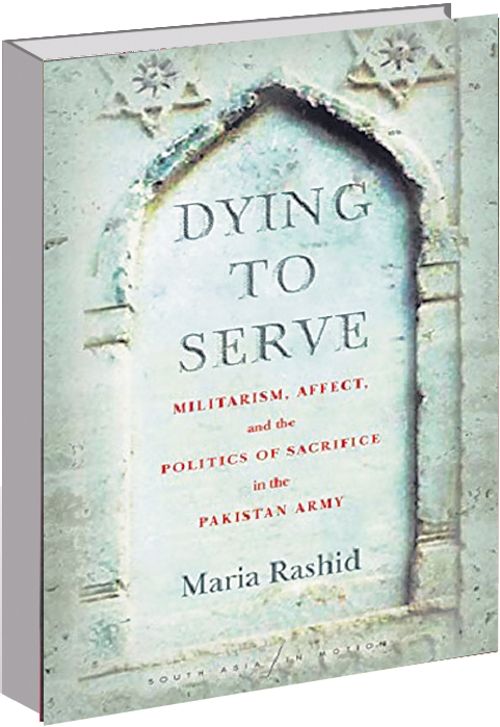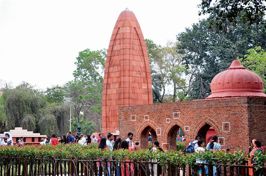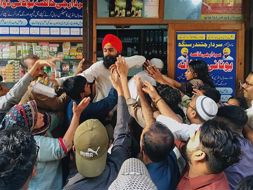Dying to Serve: Militarism, Affect, and the Politics of Sacrifice in the Pakistan Army by Maria Rashid. Stanford University Press.Pages 290. Rs 494
Book Title: Dying to Serve: Militarism, Affect, and the Politics of Sacrifice in the Pakistan Army
Author: Maria Rashid
Ajay Banerjee
A layered narrative on Pakistan army’s mix of militarised-nationalism balanced on religion and a push towards a not-so-subtle militarised society forms the crux of Maria Rashid’s book, ‘Dying to Serve: Militarism, Affect and the Politics of Sacrifice in the Pakistan Army’. It has an interesting take on how men are trained into being ‘soldiers of Islam’, the financial and emotional need of rural youth to join the army and Pakistan’s dilemma in tackling terrorism within, as the country’s enemy on its western front is not ‘Hindu India’.
The army has usurped diplomacy and foreign policy while relying on religion as a means of operation, observes Rashid. It has ruled directly for roughly half of Pakistan’s existence and indirectly for the rest of the time through ‘manipulation of domestic politics’.
Rashid brings out how textbooks in Pakistan glorify war and valorise an ‘often imagined past’ of Muslim warriors as well as military soldiers who seek martyrdom to defend their country.
The author, from a family of Pakistan army officers, has spread the book across nine chapters and supports her point based on more than a hundred interviews with soldiers from around five villages of Chakwal, one of the biggest recruiting areas of the Pakistan army. Through her contacts, she gained access to administrators and officers at Rawalpindi, the headquarters of the army, from where flows the thought process of understanding the mindset of the soldier.
Unlike the other books on Pakistan military, this one is about the soldiers, their families and their sacrifices. The resultant grief of mothers or wives is woven into a narrative.
The book has come up for review at a time when sections of the army have been accused of siding with people protesting against the arrest of former Prime Minister Imran Khan. Ironically, Rashid talks about it: “Increasing scepticism about domination of the military on the states… raises questions about the future of the army as a central fulcrum of Pakistani state.”
The Pakistan army balances the reality that soldiers join the military service as a way of ending poverty through stable employment. She brings out the dichotomy faced by Pakistan since it launched a war on terror in 2002 as the dead soldier is often not recognised as the ‘asli shaheed’ (real martyr).
The enemy in the war on terror are Muslims (the Taliban), who have a common religion and culture as the soldiers. A re-crafted war strategy includes staging events such as Youm-e-Shuhada, conducted to pay respects to those dying in the war on terror. The army has ensured that the term ‘shahadat’ (martyrdom) is for its soldiers and not the Taliban.
Rashid writes in detail about the ‘manufacturing process’ of a soldier, as to how the peasant-subjects are turned into soldier-subjects at the Abbottabad training establishment using a mix of religion and military training. The army-soldier relationship is sustained by a comprehensive welfare package enabling the status of patron for the army. Post-retirement jobs, institutional welfare, generous pensions, subsidised housing, education and health facilities, are good sops for the youth to join the army.
The author takes the reader to the underbelly of the Pakistan army. Widows of dead soldiers are expected not to remarry and in case of remarriage, their allowances could be withdrawn. The compensation packages — cash, pension, land allotment, etc — offered to the kin of ‘shuhada’ (those killed in action) are completely masked from the public view as it goes ‘against the image’ of a soldier dying in selfless sacrifice.
This is unlike India, where allowances for the kin are made public and even come up in Parliament questions.
Rashid has restricted her opinion on the making of a Pakistan soldier without any detailed mention of India. Barring passing references like ‘Hindu India’, the book has no details on the Pakistan armymen’s indoctrination against India. Maybe it could form the basis of another book.














